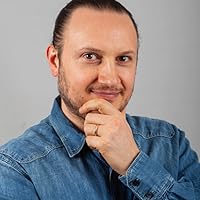Methodology Quotes
Quotes tagged as "methodology"
Showing 1-30 of 41

“I am just the biologist; I don’t require any of this to have a deeper meaning. I am aware that all of this speculation is incomplete, inexact, inaccurate, useless. If I don’t have real answers, it is because we still don’t know what questions to ask. Our instruments are useless, our methodology broken, our motivations selfish.”
― Annihilation
― Annihilation

“I have therefore included in this book details of Muhammad’s life that I subjected to an extensive analytical process. In fact, cross-referencing sources and researching the historical record is insufficient without also developing expertise in the particular nuances of Muhammad’s cultural context. One cannot understand his world without appreciating the in- formation he himself was sifting through on his life journey.”
― Muhammad, the World-Changer: An Intimate Portrait
― Muhammad, the World-Changer: An Intimate Portrait

“Hercule Poirot's methods are his own. Order and method, and 'the little gray cells'.”
― The Big Four
― The Big Four

“Thus, by science I mean, first of all, a worldview giving primacy to reason and observation and a methodology aimed at acquiring accurate knowledge of the natural and social world. This methodology is characterized, above all else, by the critical spirit: namely, the commitment to the incessant testing of assertions through observations and/or experiments — the more stringent the tests, the better — and to revising or discarding those theories that fail the test. One corollary of the critical spirit is fallibilism: namely, the understanding that all our empirical knowledge is tentative, incomplete and open to revision in the light of new evidence or cogent new arguments (though, of course, the most well-established aspects of scientific knowledge are unlikely to be discarded entirely).
. . . I stress that my use of the term 'science' is not limited to the natural sciences, but includes investigations aimed at acquiring accurate knowledge of factual matters relating to any aspect of the world by using rational empirical methods analogous to those employed in the natural sciences. (Please note the limitation to questions of fact. I intentionally exclude from my purview questions of ethics, aesthetics, ultimate purpose, and so forth.) Thus, 'science' (as I use the term) is routinely practiced not only by physicists, chemists and biologists, but also by historians, detectives, plumbers and indeed all human beings in (some aspects of) our daily lives. (Of course, the fact that we all practice science from time to time does not mean that we all practice it equally well, or that we practice it equally well in all areas of our lives.)”
―
. . . I stress that my use of the term 'science' is not limited to the natural sciences, but includes investigations aimed at acquiring accurate knowledge of factual matters relating to any aspect of the world by using rational empirical methods analogous to those employed in the natural sciences. (Please note the limitation to questions of fact. I intentionally exclude from my purview questions of ethics, aesthetics, ultimate purpose, and so forth.) Thus, 'science' (as I use the term) is routinely practiced not only by physicists, chemists and biologists, but also by historians, detectives, plumbers and indeed all human beings in (some aspects of) our daily lives. (Of course, the fact that we all practice science from time to time does not mean that we all practice it equally well, or that we practice it equally well in all areas of our lives.)”
―

“There are so many ways to account for negative outcomes that it is safer to doubt one’s methods before doubting one’s subjects.”
― Are We Smart Enough to Know How Smart Animals Are?
― Are We Smart Enough to Know How Smart Animals Are?

“The worse thing that contemporary qualitative research can imply is that, in this post-modern age, anything goes. The trick is to produce intelligent, disciplined work on the very edge of the abyss.”
― Interpreting Qualitative Data
― Interpreting Qualitative Data

“The method of science is logical and rational; the method of the humanities is one of imagination, sympathetic understanding, ‘indwelling.”
― Discerning the Mystery: An Essay on the Nature of Theology
― Discerning the Mystery: An Essay on the Nature of Theology

“A man demonstrates his rationality, not by a commitment to fixed ideas, stereotyped procedures, or immutable concepts, but by the manner in which, and the occasions on which, he changes those ideas, procedures, and concepts.”
―
―

“Why should an irrational method work when rational methods were all so rotten? He had an intuitive feeling, growing rapidly, that what he had stumbled on was no small gimmick. It went far beyond. How far, he didn’t know.”
― Zen and the Art of Motorcycle Maintenance: An Inquiry Into Values
― Zen and the Art of Motorcycle Maintenance: An Inquiry Into Values
“In Dialektik der Aufklärung discussions of Kant's ideas feature more than those of any other philosopher. Those discussions, however, rarely attempt to understand the argumentative structure of Kant's Philosophy. Kant's ideas are invoked largely as an aide to gaining greater insight into the broader phenomenon of the evolution of modern reason. The text's treatment of Kant's work is, as a consequence, fragmentary and partial. Neither scholarly accuracy nor systematic reconstruction plays a role in Horkheimer and Adorno's methodology.”
―
―

“In reality everything depends on the man and little on the method”
― The Secret of the Golden Flower: A Chinese Book of Life
― The Secret of the Golden Flower: A Chinese Book of Life

“I decided to write Parabellum because I was personally baffled by the frequency of mass shootings in the United States. The Sandy Hook school shooting was the once that really got the wheels turning. I just couldn't understand why anyone would do such a thing, and I felt compelled to grapple with all the issues at play.”
― Parabellum
― Parabellum

“The proper METHOD for studying poetry and good letters is the method of contemporary biologists, that is careful first-hand examination of the matter, and continual COMPARISON of one ‘slide’ or specimen with another.
No man is equipped for modern thinking until he has understood the anecdote of Agassiz and the fish:
A post-graduate student equipped with honours and diplomas went to Agassiz to receive the final and finishing touches.
The great man offered him a small fish and told him to describe it.
Post-Graduate Student: “That’s only a sun-fish”
Agassiz: “I know that. Write a description of it.”
After a few minutes the student returned with the description of the Ichthus Heliodiplodokus, or whatever term is used to conceal the common sunfish from vulgar knowledge, family of Heliichterinkus, etc., as found in textbooks of the subject.
Agassiz again told the student to describe the fish.
The student produced a four-page essay.
Agassiz then told him to look at the fish. At the end of the three weeks the fish was in an advanced state of decomposition, but the student knew something about it.
— ABC of Reading (1934; New Directions)”
―
No man is equipped for modern thinking until he has understood the anecdote of Agassiz and the fish:
A post-graduate student equipped with honours and diplomas went to Agassiz to receive the final and finishing touches.
The great man offered him a small fish and told him to describe it.
Post-Graduate Student: “That’s only a sun-fish”
Agassiz: “I know that. Write a description of it.”
After a few minutes the student returned with the description of the Ichthus Heliodiplodokus, or whatever term is used to conceal the common sunfish from vulgar knowledge, family of Heliichterinkus, etc., as found in textbooks of the subject.
Agassiz again told the student to describe the fish.
The student produced a four-page essay.
Agassiz then told him to look at the fish. At the end of the three weeks the fish was in an advanced state of decomposition, but the student knew something about it.
— ABC of Reading (1934; New Directions)”
―

“There was a method, a toilsome, age-old plan for systematic research, a kind of combined steamroller and fine-toothed comb which (in theory) nothing could escape...”
― The Periodic Table
― The Periodic Table
“Everyone has doubts and negative thoughts. It is , however, what you choose to do with those thoughts that matters.”
― Coach, Run, Win
― Coach, Run, Win

“if you want to understand what a science is, you should look in the first instance not at its theories or its findings, and certainly not at what its apologists say about it; you should look at what the practitioners of it do.”
― The Interpretation of Cultures
― The Interpretation of Cultures

“Counterfactuals can be considered an analog to the apple, and the invitation to engage with them a provocation to those who believe that social science or history can only be corrupted by their use. I sense that
the number of scholars who feel this way, while substantial, is on the decline.
They believe we live in a metaphorical Garden of Eden, where the social and physical worlds are ordered, predictable, and related in a holistic way. For those of us who recognize that humankind left Eden long
ago—if it ever existed—counterfactuals must be considered one more tool to help us make sense of our chaotic and unordered world, where knowledge sometimes has the effect of accelerating disorder.”
― Forbidden Fruit: Counterfactuals and International Relations
the number of scholars who feel this way, while substantial, is on the decline.
They believe we live in a metaphorical Garden of Eden, where the social and physical worlds are ordered, predictable, and related in a holistic way. For those of us who recognize that humankind left Eden long
ago—if it ever existed—counterfactuals must be considered one more tool to help us make sense of our chaotic and unordered world, where knowledge sometimes has the effect of accelerating disorder.”
― Forbidden Fruit: Counterfactuals and International Relations

“All forms of complex causation, and especially nonlinear transformations, admittedly stack the deck against prediction. Linear describes an outcome produced by one or more variables where the effect is additive. Any other interaction is nonlinear. This would include outcomes that involve step functions or phase transitions. The hard sciences routinely describe nonlinear phenomena. Making predictions about them becomes increasingly problematic when multiple variables are involved that have complex interactions. Some simple nonlinear systems can quickly become unpredictable when small variations in their inputs are introduced.23 As so much of the social world is nonlinear, fifty plus years of behavioral research and theory building have not led to any noticeable improvement in our ability to predict events. This is most evident in the case of transformative events like the social-political revolution of the 1960s, the end of the Cold War, and the rise and growing political influence of
fundamentalist religious groups.
Radical skepticism about prediction of any but the most short-term outcomes is fully warranted. This does not mean that we can throw our hands up in the face of uncertainty, contingency, and unpredictability. In a complex society, individuals, organizations, and states require a high degree of confidence—even if it is misplaced—in the short-term future and a reasonable degree of confidence about the longer term. In its absence they could not commit themselves to decisions, investments, and policies.
Like nudging the frame of a pinball machine to influence the path of the ball, we cope with the dilemma of uncertainty by doing what we can to make our expectations of the future self-fulfilling. We seek to control the social and physical worlds not only to make them more predictable but to reduce the likelihood of disruptive and damaging shocks (e.g., floods, epidemics, stock market crashes, foreign attacks). Our fallback strategy is denial.”
― Forbidden Fruit: Counterfactuals and International Relations
fundamentalist religious groups.
Radical skepticism about prediction of any but the most short-term outcomes is fully warranted. This does not mean that we can throw our hands up in the face of uncertainty, contingency, and unpredictability. In a complex society, individuals, organizations, and states require a high degree of confidence—even if it is misplaced—in the short-term future and a reasonable degree of confidence about the longer term. In its absence they could not commit themselves to decisions, investments, and policies.
Like nudging the frame of a pinball machine to influence the path of the ball, we cope with the dilemma of uncertainty by doing what we can to make our expectations of the future self-fulfilling. We seek to control the social and physical worlds not only to make them more predictable but to reduce the likelihood of disruptive and damaging shocks (e.g., floods, epidemics, stock market crashes, foreign attacks). Our fallback strategy is denial.”
― Forbidden Fruit: Counterfactuals and International Relations
“This is a problem in the research method of Orientalists — they often refer to the wrong sources on a subject and consequently come to the wrong conclusions. It is not applicable to refer to works of tafsir in order to research the history of Hadith. Tabari’s tafsir is not a place to find anything on the science of Hadith. His style is to mention a verse, list all the narrations about its interpretation and then give one interpretation more weight over the other.”
― The Necessity of the Hadith in Islam
― The Necessity of the Hadith in Islam

“professionals who know what they are doing can "be counted on to follow a well-thought-out methodology”
― The Sign
― The Sign
“I love running! I began running as an adult and became addicted, running over 70,000 miles, much of it alongside the athletes I was lucky enough to coach.”
― Coach, Run, Win
― Coach, Run, Win
“Although these techniques require that the fieldworker approach his people with the sympathy of a friend, the intuition of an artist, and the objectivity of a scientist, the data gathered may be as reliable and as directly related to the central problem of inquiry as in the laboratory sciences.”
―
―
“A successful hacking methodology is built on accumulated experience with diverse techniques, explored creatively.”
―
―

“The research for the leitmotif, for the rhythm of thoughts in motion, needs to be more important than single casual statements and 'staccato' aphorisms.”
― Quaderni del Carcere: edizione integrale con tutti i volumi
― Quaderni del Carcere: edizione integrale con tutti i volumi

“Un metodo esiste solo se è scritto”
― Come trasformare il saper fare in metodo: Formula passo passo per scrivere e pubblicare una guida pratica (I quaderni di Liquid Diamond)
― Come trasformare il saper fare in metodo: Formula passo passo per scrivere e pubblicare una guida pratica (I quaderni di Liquid Diamond)
“هناك فجوات علمية عادية من المرجح أنه لو استمر تقدم العلوم بنفس المعدل الحالي أن يتم سدها، وهناك فجوات جوهرية وأسئلة وجودية نعرف بالبداهة أن العلم لن يبلغ فيها شيئا يُذكر لأنها خارجة عن نطاق بحثه”
― معادلة الإيمان
― معادلة الإيمان
“الفلسفة المادية ليست جزءا أصيلا من طبيعة العلم، فإن غاية العلم هي الوصول للحقيقة واتباع الدليل، وليس ثمة إثبات أن الحقيقة هي المادة والطاقة التي يمكن قياسهما في المعمل فقط”
― معادلة الإيمان
― معادلة الإيمان
All Quotes
|
My Quotes
|
Add A Quote
Browse By Tag
- Love Quotes 102k
- Life Quotes 80k
- Inspirational Quotes 76.5k
- Humor Quotes 44.5k
- Philosophy Quotes 31.5k
- Inspirational Quotes Quotes 29k
- God Quotes 27k
- Truth Quotes 25k
- Wisdom Quotes 25k
- Romance Quotes 24.5k
- Poetry Quotes 23.5k
- Life Lessons Quotes 23k
- Quotes Quotes 21k
- Death Quotes 20.5k
- Happiness Quotes 19k
- Hope Quotes 18.5k
- Faith Quotes 18.5k
- Inspiration Quotes 17.5k
- Spirituality Quotes 16k
- Relationships Quotes 16k
- Motivational Quotes 15.5k
- Religion Quotes 15.5k
- Life Quotes Quotes 15.5k
- Love Quotes Quotes 15k
- Writing Quotes 15k
- Success Quotes 14k
- Motivation Quotes 13.5k
- Time Quotes 13k
- Motivational Quotes Quotes 12k
- Science Quotes 12k

